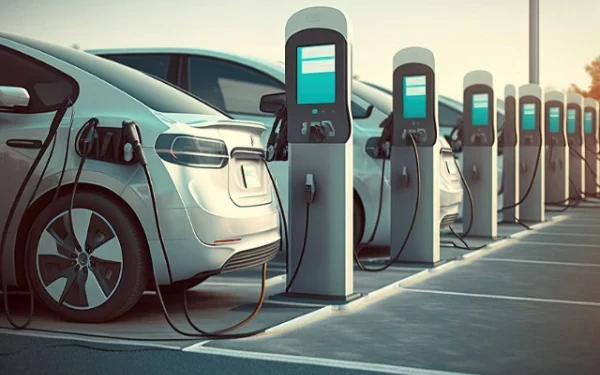Introduction: Pakistan Accelerates Transition to Electric Mobility
In a significant development that reflects Pakistan’s commitment to clean energy and sustainable transportation, the country has witnessed major progress in the development of electric vehicle (EV) infrastructure. According to official reports, more than 3,800 investors and companies have expressed a keen interest in establishing electric vehicle charging stations across the country.
This surge in investor interest is being seen as a crucial milestone in Pakistan’s effort to reduce carbon emissions, combat climate change, and modernize its transportation systems in line with global trends. The National Energy Conservation and Conservation Authority (NECCA) has been playing a pivotal role in enabling the ecosystem for EVs, ensuring faster processing of licenses and encouraging private sector participation.
Key Highlights of EV Infrastructure Development
- 3,800+ investors and companies have shown interest in EV charging stations.
- 71 EV charging stations have been officially licensed by NECCA so far.
- 128 applications are in the process of registration.
- Government has reduced electricity tariff for EV charging stations.
- Licensing process completed within 15 days of document submission.
- Growing involvement of both local and international companies in infrastructure development.
Role of NECCA and Leadership of Dr. Sardar Moazzam
The Managing Director of the National Energy Conservation and Conservation Authority (NECCA), Dr. Sardar Moazzam, has been at the forefront of this initiative. Speaking to the media, Dr. Moazzam highlighted the exponential growth in interest shown by investors and shared promising data regarding current and upcoming projects in the electric vehicle infrastructure space.
He revealed that 30 to 35 EV charging stations are already operational and have applied for official registration, marking a significant milestone in the rollout of the country’s EV network. NECCA, under his leadership, has been proactive in facilitating and expediting the registration and licensing process for new EV infrastructure ventures.
Growing Investor Confidence and Interest
Dr. Moazzam emphasized that the surge in applications is a direct result of the government’s business-friendly policies, particularly the decision to reduce electricity tariffs for EV charging stations. This policy shift has significantly boosted investor confidence, making the EV infrastructure sector more economically viable.
“Due to the reduction in the tariff of charging stations, the interest of investors has increased tremendously. We are witnessing serious interest from both local entrepreneurs and multinational energy companies,” said Dr. Moazzam.
International and Local Partnerships Gaining Momentum
NECCA officials have confirmed that several international and local companies are in active communication with the authority. Discussions are focused not only on setting up traditional EV charging stations but also on launching battery swapping infrastructure, a concept gaining traction in various parts of the world for its speed and efficiency.
Battery swapping stations allow EV users to exchange depleted batteries with fully charged ones, drastically reducing the wait time compared to conventional charging. This technology has been successfully implemented in countries like China and India and could revolutionize Pakistan’s approach to EV infrastructure.
Current Licensing and Registration Statistics
As per the official data shared by NECCA:
- 71 EV charging stations have been officially licensed and are operational or in the final stages of implementation.
- 128 applications for additional EV charging stations are currently under review and in the registration phase.
- On average, license approval is granted within 15 days of the completion of documentation, reflecting the government’s push for faster infrastructure development.
Process for Setting Up an EV Charging Station in Pakistan
To further support the transition to electric mobility, the Pakistani government has streamlined the process of setting up charging stations. According to NECCA:
- Interested investors or companies submit their application and required documents to the authority.
- The documentation is reviewed for compliance with safety and energy standards.
- Upon successful verification, the license is issued within 15 days.
- NECCA also offers technical support and coordinates with power distribution companies (DISCOs) to ensure timely grid connectivity.
This transparent and expedited process aims to remove bureaucratic delays and encourage maximum private sector participation.
Tariff Reduction: A Game-Changer for the EV Ecosystem
One of the pivotal policy decisions that catalyzed investor interest was the reduction in electricity tariffs specifically for EV charging stations. By offering a concessional tariff rate, the government has made it financially attractive for investors to enter this emerging sector.
The lower tariff allows EV station operators to offer competitive prices to customers, making electric vehicles more economical to operate compared to traditional petrol or diesel vehicles.
Benefits of Expanding EV Infrastructure in Pakistan
1. Environmental Sustainability
With the transport sector being one of the leading contributors to greenhouse gas emissions, the expansion of EV infrastructure plays a crucial role in Pakistan’s climate change mitigation strategy. By replacing fossil-fuel vehicles with EVs, Pakistan can significantly reduce its carbon footprint.
2. Economic Growth and Job Creation
The development of EV infrastructure is expected to create thousands of jobs in sectors such as:
- Electrical engineering
- Software development
- Construction and maintenance
- Sales and marketing
Furthermore, local manufacturing of EV components may also be boosted in the near future.
3. Energy Diversification
EV charging infrastructure promotes clean electricity consumption, especially when powered by renewable energy sources such as solar or wind. This helps reduce reliance on imported oil, thereby improving energy security and reducing the trade deficit.
4. Urban Innovation and Smart Cities
With EVs becoming integral to smart city planning, the government’s push for charging stations complements its broader vision of digital, efficient, and sustainable urban development.
Challenges Ahead in EV Infrastructure Expansion
While the progress is commendable, several challenges still need to be addressed:
- Grid capacity and load management in peak hours.
- Need for standardized charging protocols and safety regulations.
- Building awareness and educating the public on the benefits of EVs.
- High upfront cost of EVs, which may limit adoption without adequate incentives.
To overcome these challenges, government departments, private sector stakeholders, and civil society must work in coordination.
Pakistan’s National Electric Vehicle Policy (NEVP)
Pakistan’s EV progress is guided by the National Electric Vehicle Policy (NEVP), which was approved in 2019. The key objectives of the policy include:
- Achieving 30% electric vehicles in total passenger vehicle sales by 2030.
- Encouraging local manufacturing of EV parts and batteries.
- Offering tax exemptions and other incentives to EV buyers and investors.
- Developing a national network of charging stations.
NEVP is aligned with Pakistan’s commitment to the Paris Agreement and its Nationally Determined Contributions (NDCs) under the UN Framework Convention on Climate Change.
Conclusion: Pakistan on the Road to a Greener Future
Pakistan’s rapid progress in establishing electric vehicle charging infrastructure is a promising sign of its transition toward sustainable transportation. With over 3,800 investors expressing interest, and government institutions like NECCA facilitating rapid licensing and tariff reductions, the momentum is clearly in favor of widespread EV adoption.
As more EV charging stations become operational and awareness grows among consumers, Pakistan could become a regional leader in clean mobility and innovation. The collaborative efforts between public institutions and private stakeholders, combined with robust policymaking, are paving the way for a greener, more sustainable future.

























